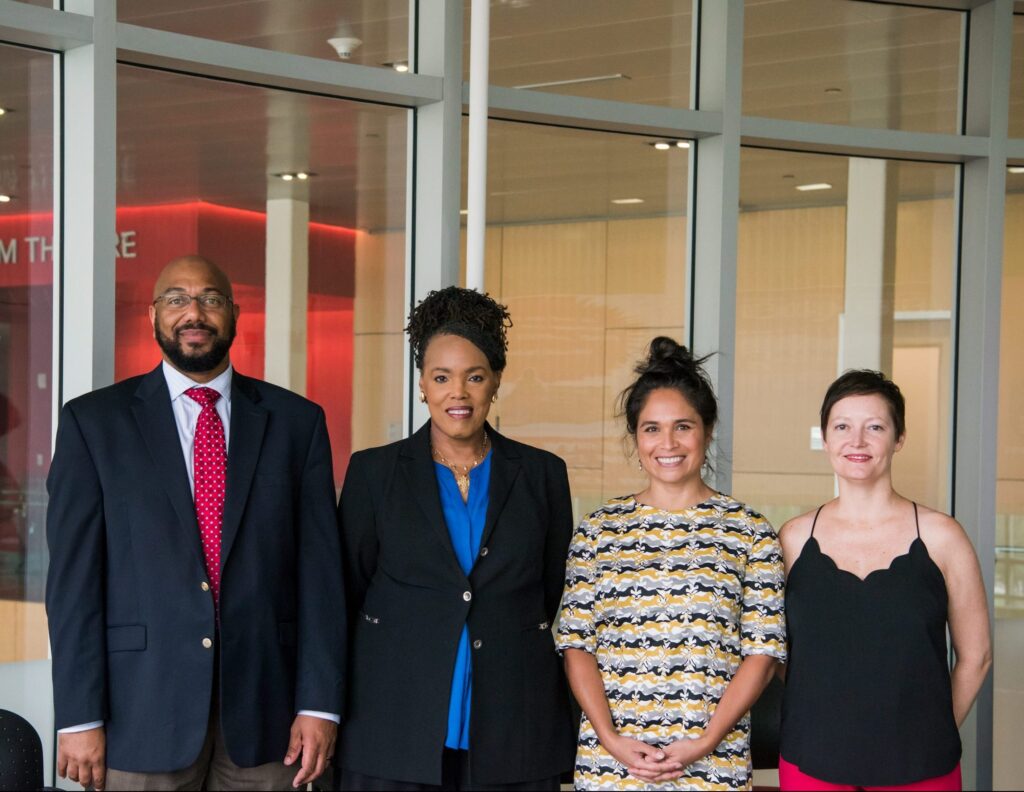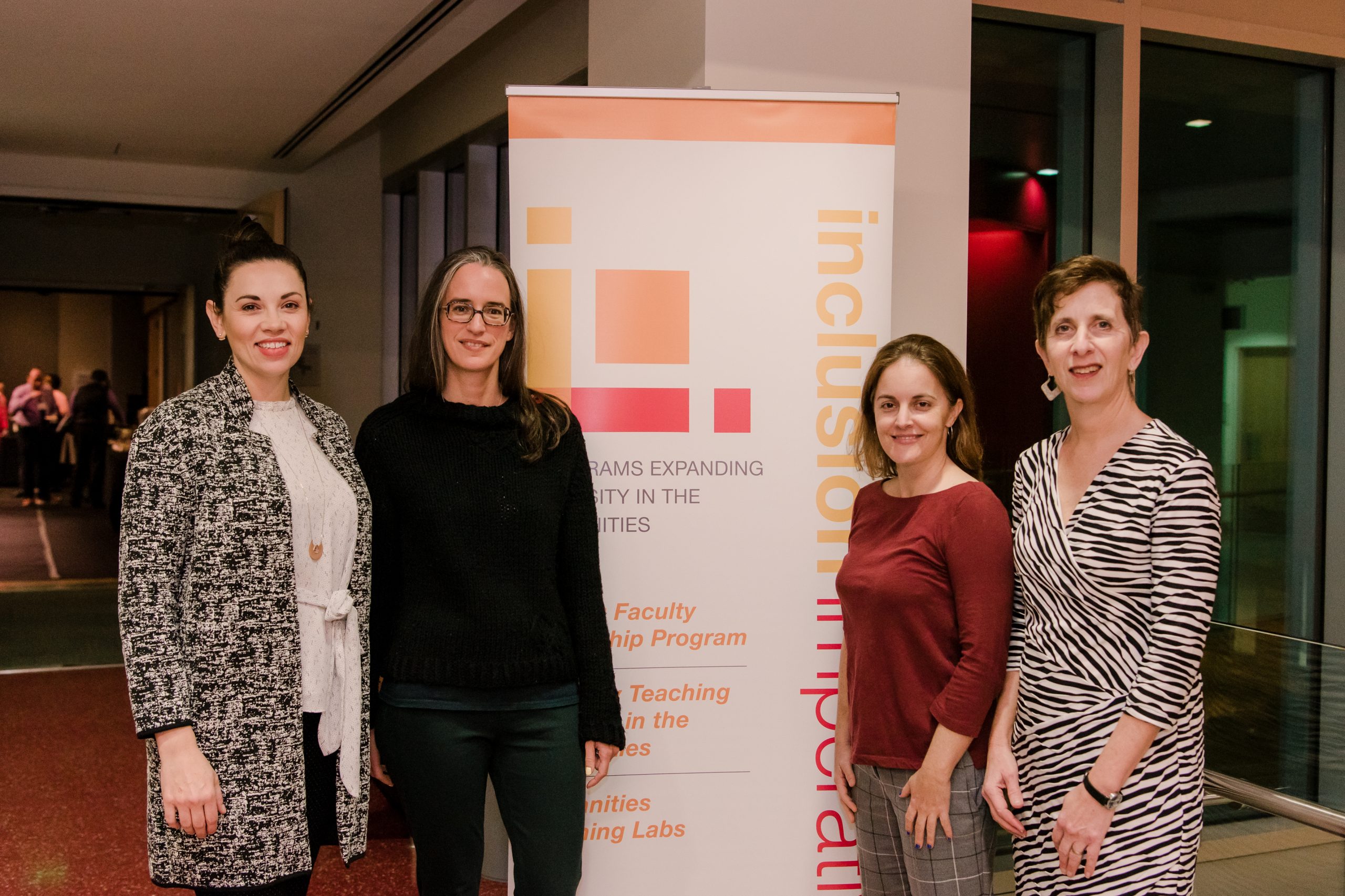UMBC’s Inclusion Imperative is now in its third year of promoting diversity and inclusion in the humanities—on campus and across the region. The five-year initiative, funded by a $750,000 grant from The Andrew W. Mellon Foundation, began in March 2017. This grant provides support for a Visiting Faculty Fellows Program, Diversity Teaching Network in the Humanities, and Humanities Teaching Labs. All three programs have had a notable impact and continue to grow.
The Inclusion Imperative is led by Scott Casper, dean of UMBC’s College of Arts Humanities and Social Sciences, and Jessica Berman, director of the Dresher Center for the Humanities. The three core Inclusion Imperative programs support a regional community of scholars committed to diversity in the humanities. They also focus on expanding community-engaged humanities research and implementing new approaches to teaching and learning in the humanities.
“The Inclusion Imperative has created real excitement about the benefits of connecting humanities faculty with one another,” shares Berman. “Faculty at UMBC have learned a variety of new tools to practice inclusive and engaged teaching. They have been able to exchange ideas with visiting scholars about methods of inclusive research in the humanities.”
Humanities Teaching Labs
Lindsay DiCuirci, associate professor of English, is the director of the Interdisciplinary Humanities Teaching Labs (HT Labs). They bring together visiting fellows, UMBC faculty, graduate and undergraduate students, and Baltimore community partners. Together, these collaborators examine issues of race, equity, inclusion, and justice. The labs share different approaches and strategies in humanities work, and show how faculty can create active learning projects.

One popular UMBC faculty-led HT Lab focused on integrating crowdsourced transcription projects into undergraduate coursework. Others have explored diversity-focused digital humanities projects in the classroom and best practices for interviewing and collecting oral histories.

HT Labs led by external experts have demonstrated how to use software to create content and analyze data. Faculty also participated in a workshop on how to engage diverse communities by using Baltimore Sun photographs housed in UMBC’s Special Collections.
Course transformations
The HT Labs initiative also offers Course Transformation Support Grants. With these grants, faculty redesign their courses to reflect new approaches and technologies, and more diverse perspectives.
One of the first three faculty members awarded a transformation grant was Earl Brooks, assistant professor of English. He used the funding to purchase recording equipment for students to use in his Sounds Like Social Justice course. They created interactive media projects that use sound to tell stories related to social justice.

“The grant made it possible for my students to have the technology they needed to create high-quality digital media projects,” shares Brooks. “This was a pivotal improvement that strengthened our collective commitment to the digital humanities.”
Jennifer Maher, associate professor of English, combined two of her classes to create a more community-engaged experience. Maher’s communication and technology seminar focused on race, rhetoric, and technology. Students worked closely with Nina Duzhikhin’s Community Closet to create new marketing materials for the clothing donation group. The class also collaborated with UMBC’s Choice Program, New Media Studio, and WombWork Productions on promotions. They developed effective and culturally-sensitive marketing materials to create awareness of clothing drop-off locations throughout Southwest Baltimore.
“The intersections among race, rhetoric, and technology materialized for students in very real and important ways,” says Maher. “Topics such as gentrification manifested right in front of our eyes. These experiences could not be happen in a more traditional class environment.”
Nicole King, professor and chair of American studies and director of the UMBC Orser Center for the Study of Place, Community, and Culture, also received a grant. She used it to engage radio producer Aaron Henkin in her Public Humanities course. She also brought in local speakers to share their expertise in community-engaged humanities work.
Visiting faculty fellows
The Inclusion Imperative also invites full-time faculty from colleges and universities across the region to apply for visiting faculty appointments at UMBC. This fellows program supports humanities scholars who commit to advancing diversity through research. The program works to connect them to the UMBC campus community. Fellows work with UMBC faculty in similar research areas.

UMBC has so far hosted four visiting faculty fellows. Katherine Bankole-Medina, professor of history at Coppin State University, researched the history of African Americans in clinical care settings based on 40 years of the Maryland Medical Journal. Her foundational work at UMBC evolved into a book project. She collaborated with Shawn Bediako, associate professor of psychology and director of UMBC’s Collaborative for the Interdisciplinary Promotion of Health Equity Research (CIPHER).
Theresa Runstedtler, associate professor of history at American University, explored the intersection of blackness, masculinity, labor, and criminalization through the lens of 1970s professional basketball. In the fall of 2019, Runstedtler received a National Endowment for the Humanities Public Scholar award for the project she worked at UMBC. Nicole King collaborated with Runstedtler during her time at UMBC, which led to joint presentations at national meetings and other continuing projects.
This year’s fellows
This year’s fellows are Elizabeth Groeneveld, assistant professor of women’s studies at Old Dominion University, and Tracy Perkins, assistant professor of sociology and criminology at Howard University.
Groenveld is exploring how lesbian pornographic media has shaped ideas about objectification and the body by developing a discourse of sex-positive feminism. Kate Drabinski, senior lecturer of gender, women’s, and sexuality studies, is her faculty collaborator.

“Working with Liz has been a great experience. We learn about each other’s research and write together regularly. It keeps both of us on track while also building real community around the writing process itself,” shares Drabinski. “I am excited for the ways our work in queer histories will intersect long after the fellowship year is over.”
Perkins’s project covers a 1990s campaign to stop the construction of a nuclear waste landfill in the Mojave Desert’s Ward Valley. Dillon Mahmoudi, assistant professor of geography and environmental systems, serves as her UMBC collaborator.
Diversity Teaching Network
The Diversity Teaching Network brings together faculty at UMBC, HBCU partners, and other institutions in the Baltimore-DC region. The network’s activities expand conversations on diversity in curricula, socially-aware humanities pedagogies, and community-engaged research. These activities create a supportive environment for faculty to pursue inclusive teaching practices.
The inaugural Diversity Teaching Network event last year was headlined by noted scholar Gloria Ladson-Billings. Kerrie Kephart, associate director of the UMBC Faculty Development Center, led a workshop about practicing inclusive teaching in the classroom.
The workshop “challenged faculty to collaboratively develop responses to real-life teaching challenges,” she explains. “This includes how to create inclusive syllabi and assignments, and how to facilitate class discussions around ‘hot button’ topics.”
One event included discussions about the history and evolution of African texts. It provided suggestions on how to integrate them into U.S. university settings. Another discussed linguistic diversity as a cultural resource.
In the spring of 2019, the Diversity Teaching Network held its inaugural symposium, “Being Human: How the Arts and Humanities Expand Boundaries and Inspire Action in the 21st Century” at Bowie State University. Faculty from UMBC, Bowie State University, Coppin State University, American University, and Howard University participated in panels on the intersection of teaching, action, and justice.
Faculty at the event shared best practices in community-engaged humanities research. They built on connections developed over the past three years and generating ideas for future work together.
“The Inclusion Imperative is fostering an increasingly collaborative, inclusive approach to humanities teaching and scholarship,” shares Dean Casper. “I’m excited about continuing this work, both within UMBC and with our partner institutions.”
Banner image: (L to R) Courtney C. Hobson M.A.’14, history, coordinator for the Dresher Center; Joby Taylor ’05, Ph.D., LLC, director of the Shriver Peaceworker Program; and Beverly Bickel, clinical associate professor of language, literacy, and culture doctoral program. Photo by Marlayna Demond ’11 for UMBC.
Tags: CAHSS, DresherCenter, English, GES, GWST, History, Psychology

